In early May a movement that had convulsed university campuses across the United States suddenly took root here.
For weeks, student activists at Trinity College in Dublin had been planning and biding their time and on Friday 3 May, as the pressure of exams eased for many, they moved.
Fifteen tents were pitched on the grass in Fellow’s Square, just beside the entrance to the Book of Kells exhibition.
Their focus was Gaza. Their goal: an immediate end to all business and academic connections between Trinity College and Israel.
By Saturday morning, their numbers had grown.
“I was saying to myself for the past week ‘I wish Trinity would do something like the American encampments’ and as soon as I heard, I immediately packed my bags” one emotional student at the encampment told me that weekend.
Describing the mood she said: “It is definitely an overwhelming feeling of solidarity and empathy”.
The Trinity College encampment was short. The fact that the university was obliged to shut its lucrative Book of Kells exhibition just as the busy summer season began no doubt concentrated minds.
Within five days a deal had been struck and students ended their action. But the idea had germinated and within days student encampments had sprung up at UCD and at UCC. Their goals were identical.
“As students and staff within University College Dublin, we will no longer accept the morally inconsistent and continued feigned neutrality of the University in the face of an ongoing genocide,” a statement from the students at UCD read.
“A genocide is a lot more important than exams,” student Éabha Hughes told me as she faced into her final year exams. “I can retake my exams, but people are losing their lives”.
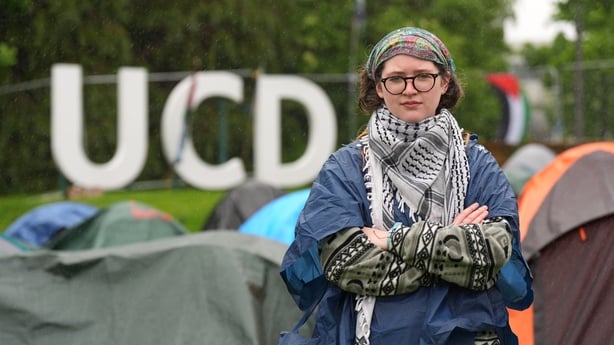
After the barren years of Covid-19, when campus life was extinguished, the intensity and sense of purpose of the encampments was striking.
At the UCD camp on its 12th day, when RTÉ News visited, students sat in the shade of stretched tarpaulins listening intently to a talk on ‘the environmental politics of the Israeli occupation’. Others came and went, getting or delivering items to a makeshift kitchen, while more still preferred to sit in groups in the May sunshine.
More than six months on, and as 2024 drew to a close, the young people who were involved in the encampments look back on their actions with a mixture of pride, and some frustration.
For Laszlo Molnarfi, who led the TCD encampment, the events of the early summer, both in Ireland and abroad, form part of a wider picture and a historical pattern.
The former TCD Students’ Union president, now completing his final year as a student of Politics, Philosophy, Economics and Sociology (PPES), refers to 1968 when campus protests against the war in Vietnam ignited across the US and elsewhere.
He talks about May ’68 in Paris when, on 3 May, students struck for more rights and against the war and this led to a wave of revolt that reshaped French public life.
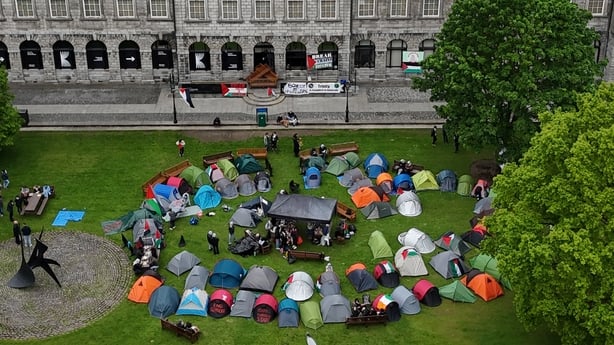
He believes the student encampments here have helped shape Ireland’s wider approach towards Palestine and Israel’s actions.
“Usually in history it is the student movement that takes the most radical actions and this is what happened here. It’s all part of one movement. Just a few weeks later (28 May) the Irish Government recognised the State of Palestine.”
Miranda Bauer is current President of UCD’s Students Union and was centrally involved in the encampment there. Although frustrated with how long it has taken to establish working groups to look at issues such as policies on ethical investment, and on institutional links, she says: “I do think there have been a number of tangible results”.
She points to greater oversight and scrutiny now of research partnerships, and the statement that UCD issued in early June, which led to the end of the encampment.
“We are outraged by the ongoing mass killing of civilians, the withholding of humanitarian aid, and the destruction in Palestine by Israel,” it read.
While stopping short of using the word ‘genocide’ that the students had demanded, the statement did refer to “the Irish government’s recognition of the state of Palestine and their intervention in South Africa’s case against Israel under the Genocide Convention at the International Court of Justice”.
“That was a pretty big symbolic win for us,” Miranda says.
But the biggest win of all is something less easy to define.
“To be honest, the more time passes, the more I admire everyone that was involved. It was a huge show of solidarity. It was people putting aside their own concerns and pausing their own lives to stand for human rights and in solidarity with others. It was so strong.”
Miranda feels that the action that students engaged in last summer has given birth to something that will endure, with ongoing student engagement over Palestine but also with wider student politics.
“I was afraid that after the encampments people would be ‘oh OK that’s it’. But they have remained so engaged [on the issue of Palestine]. Everyone understands that they still have to play their role, and it has given people a community of like-minded people as well.”
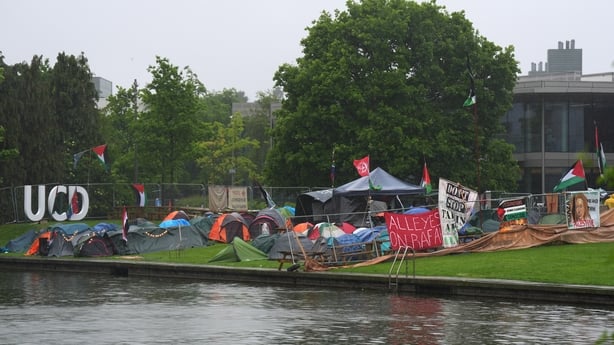
At Trinity College, Jenny Maguire, current TCD Students’ Union President, agrees.
“If I look back to a year ago, when the college wouldn’t even say the word ‘genocide’, when security was called and we had heated confrontations [at protests over Gaza]. Now so many people who were afraid to speak out about Gaza can do so publicly. The fundamental shift in the university cannot be overstated”.
She too sees the impact of the encampments as far-reaching. Coming after the shutdown of campus life during Covid-19, this has been all the more welcome.
“This year we have had the highest engagements on university activity since Covid. It has led to a renewed interest in college life. We have seen participation in class rep elections double. It has also given people a sense of responsibility for other social issues – from trans issues right through to engaging in the general election, the sense of community has increased across the board.”
Prominent among the young people who camped out over the summer were students of subjects such as philosophy, history, politics and sociology. They saw a contradiction between the purpose of a university and how those same institutions were responding.
“The ideal for a university is to teach critical thought and when to stand up, and at graduation ceremonies that is what the president talks about. But when students actually do stand up, they don’t seem to welcome it as much,” said History student Morgan Hegarty from the UCC encampment.
He mused about the college’s legacy, asking: “How does UCC want to be remembered? Does it want to be remembered for standing up on the right side of history or for silence in the face of genocide?”
For students at UCC and UCD it took longer, but eventually the colleges reach agreement over demands made by their activists.
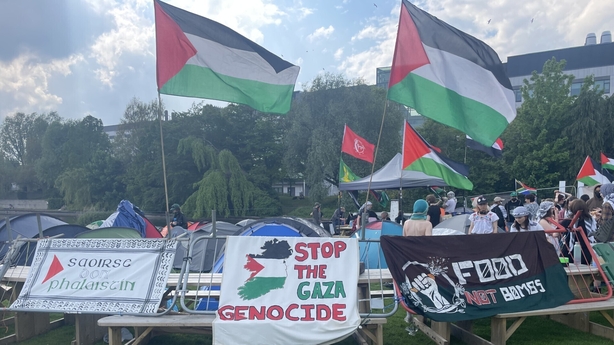
The three universities say they are now working with students to progress these. Responding to queries from RTÉ News all three itemised working groups that have been established looking at issues such as ethical investment and sustainable procurement, scholarships that have been offered to Palestinian students, and other actions.
UCC said: “UCC has worked together to advance our commitments to ensure that the University does all within its ability to respond to the crisis in Gaza and to advance peace and human rights more generally … by continuing to work together, significant, and meaningful action that will give effect to our common objectives in support of global peace and human rights can be achieved”.
But at UCC too some of the students who camped out over the summer feel disheartened by what they feel is a pace of change that is too slow.
“Our biggest concern still is that we haven’t seen meaningful progress. We wanted to see work done to bring an end to UCC ties with Israeli institutions. UCC has set up a timeline but we don’t have transparency on that timeline,” Ainsley-Kay Rucker said.
Ainsley-Kay has just completed a Masters in Philosophy at the university, but her activism is continuing.
Now involved in protests at Shannon Airport she too sees a link between what students did and a wider movement, but she feels more needs to be done, particularly by Government.
“They have recognised Palestine as a country but they are not really doing any meaningful work to end the genocide. It would be nice to see the Occupied Territories Bill passed, and a new government needs to ensure that Shannon Airport is no longer used as a refuelling point for US military and stop the use of Irish airspace by companies supplying weapons to Israel”.
Who were the students who protested?
One notable feature of the encampments was the number of Jewish students involved. They include both Ainsley-Kay and Miranda Bauer.
“There are many Jewish people here who do not support Israel,” says Ainsley-Kay. She feels this is rarely reflected in the media here which is “a really big concern” she adds, even contributing to anti-Semitism in Ireland.
Last spring, I asked another Jewish student, Quinn Katz-Zogby, about claims that Jewish students on US campuses feared for their safety because of the protests in support of Gaza.
Quinn, who is the incoming chair of the BDS (Boycott, Divestment and Sanctions) group at Trinity College, told me: “I am a Jewish student on campus. My great-grandparents fled Nazi Germany”.
Dismissing any suggestion that such protests are anti-Semitic, he said: “It’s very disheartening to see my own culture diminished. My own identity is being weaponised and used against people [in Gaza] that I also feel kinship towards”.
Quinn is from the US and, as his first name hints, he also has Irish heritage.
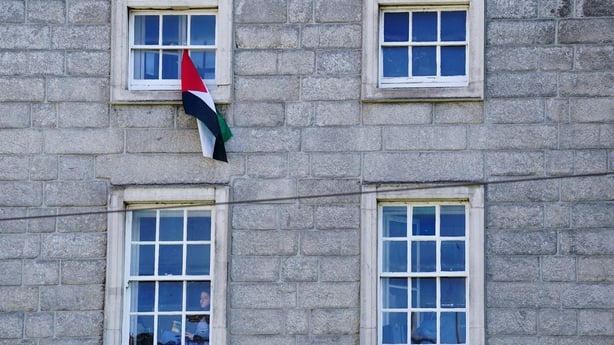
Another notable feature of the encampments was the very significant number of international students who became involved in and often led the protests. Many of them pay big money to come and study here and their involvement indicates this cohort is well integrated into the fabric of student life.
Student politics has always served as an incubator of talent for national politics and public life. We are likely to see more of some of the young people who led or participated in the encampments in years to come.
“In the moment what we did felt so small and so insular, but its reach has been a lot greater than we expected,” says Martha Ní Riada, who as UCD Student Union president led the protest there. Martha now has a job with the Social Democrats.
“Even though our wins feel so slow to materialise, so many people are proud of what we did. It has been confidence building. It has shown us that moments of collective solidarity can actually lead to change”.
